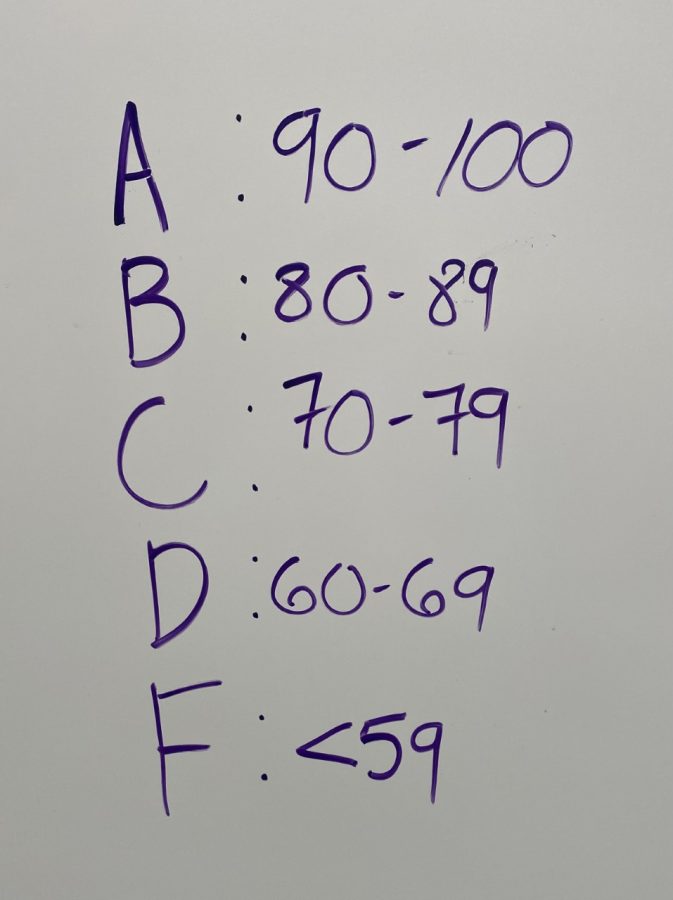Is the Traditional American Grading System Worth the Pressure on Students?
A high-pressure learning environment leads to burn out, not a blaze of glory.
The standard grading system used in traditional American public schools places pressure on students to perform to the system’s best, not their own.
Student mental health is a rising discussion, and fingers are being pointed everywhere. Time spent online, hormonal changes, family/friend relationships, etc. are all listed as possible factors- but one of the causes under scrutiny right now is school. High expectations from teachers, their parents, or themselves are causing unprecedented levels of anxiety in teens. College and 4.0 GPAs have become a common goal, but is it fair to ask this of students?
Changing the education system to approach grades differently could benefit students, especially their stress levels. Stress is harmful both physically and emotionally, and it makes learning more difficult. Not being able to focus negatively impacts the student, so unless they find alternative coping methods, they will not learn as effectively.
Many students already feel the pressures of this constant stress. A national survey taken by parents, put out by WedMD, showed “school” as being listed among the top sources of distress and that “…72% of children have negative behaviors linked to stress, and 62% have physical symptoms linked to it, such as headaches and stomachaches”.
While it is true that high school will inherently be stressful for many teenagers, it still ultimately leads to grades being a defining factor, and this anxiety over grades is not just limited to new freshman and college-bound seniors.
Across America, students of all ages are feeling the heat of impending report cards and grades. Marian Earls, MD, a pediatrician for development and behavior has found “’…third-graders coming in for help because their parents are noticing sleep problems, tearfulness, and reluctance to go to school because of all the hype on performance and testing.” Standardized testing and grades are affecting kids at a younger and younger age.
The issue with this is not so much a lack of care on administration’s end, but a shortage of resources. Therapists and psychologists, trained to support students, are critically understaffed in schools. The National Association of School Psychologists, the organization dedicated to providing such services, “…recommends a ratio of no more than 500 students per school psychologist… Unfortunately, evidence suggests that most school districts do not meet these standards.” Abington High School does meet these standards, but many schools do not. Schools create stress, but do not follow up with the support to manage it in a healthy manner.
Without these supports, mental health suffers greatly. The pressure of grades builds up and the student has no way to cope. Some turn to unhealthy methods, like substance abuse or NSSI (non-suicidal self-injury, more commonly referred to as self harm) as a means to let off energy.
Grades affecting stress and a person’s way of dealing with it will also affect their actions. If the stress builds up to an extreme extent, some teenagers turn to extreme measures. In the United States, the 2018 second leading cause of death for teenagers was suicide. One suicide letter, left behind by a sixteen year old boy who took his life, discussed how “One slipup makes a kid feel like the smallest person in the world. You are looked at as a loser if you don’t go to college or if you get a certain GPA or test score… So much pressure is placed on the students to do well that I couldn’t do it anymore.” The internalization of grades, the stress of them, cause a mass crisis in youth as lives are cut short.
It is true that grades show work ethic and eventually can lead towards scholarships. But why even base the education system on that to begin with? A letter on a computer screen is not able to encapsulate the full picture- if the student was struggling with mental health, family life, had a job, or had interests outside of “traditional” classes (math, history, English, foreign language, and science). A person’s potential is greater than a report card, and their mental health infinitely more significant.
We need to change our approach to grades, as the collective high pressure mindset creates unnecessary tension which leads to harm in students. With a lack of support in the school system, they are unable to have safe and healthy methods to deal with it. This makes it difficult-at times impossible- to learn. With emotional health and developmental maturity put as a priority, students would be in a safer and healthier space to learn.
Placing student emotional needs before their grades would lead to a learning environment where they are allowed to take their time comprehending the material and not internalize a fear of failure. The eased pressure would allow for a more welcome environment, which would grow their love of learning. Education does not simply extend to academics, but to personal happiness and identity; and learning about one’s self is all too often overlooked by the traditional system.

Amaya Turner (Class of 2023) joined the Green Wave Gazette staff her freshman year. This is her third year on the paper, and she has moved up from Copy...

